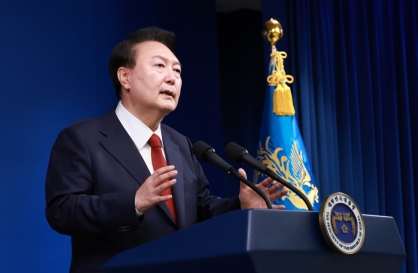
Forest agency expands scope of cooperation to Latin America
The Korea Forest Service leads the vanguard of the nation’s push for lowering carbon emissions and developing green industries.
The KFS, in charge of forest policies, has promoted the policy of low carbon emission and green growth on the basis of its “Fifth National Forest Plan.”
The 10-year plan, which was implemented in 2008, is designed to further expand the implementation of sustainable forest management in pursuit of maximizing forest functions.
The Korea Forest Service leads the vanguard of the nation’s push for lowering carbon emissions and developing green industries.
The KFS, in charge of forest policies, has promoted the policy of low carbon emission and green growth on the basis of its “Fifth National Forest Plan.”
The 10-year plan, which was implemented in 2008, is designed to further expand the implementation of sustainable forest management in pursuit of maximizing forest functions.

KFS officials said the forests are a key resource to achieving green growth.
Taking such an opportunity in the forestry sector under the paradigm of low carbon green growth, the KFS is making efforts to further encourage and strengthen the forest sector at the domestic level and to take part as a global green leader at the international level, based on its successful experiences in forest rehabilitation, officials said.
Notably, the ambitious plan highlights the importance of forest functions in responding to climate change.
The KFS focuses on promoting the systematic implementation of forest conservation and management, fitting for the purpose of achieving well-balanced land development and conservation.
The overall vision of the Fifth Plan is “to realize a green nation with sustainable welfare and growth” by sustainably managing forests as key resources for strengthening nation’s economic development, land conservation and improved quality of life.
Since the 1992 Rio de Janeiro international environment conference, restrictions on deforestation have been strengthened in efforts to preserve the global environment.
The restrictions dealt a blow to Korea, which had relied on lumber imports for 85 percent of its domestic demand. Officials said the heavy dependence had served as a factor destabilizing the nation’s economy because domestic consumption has been greatly affected by the foreign resource.
In this context, the KFS has felt the need to map out a policy that could ensure a long-term and stable supply of lumber. To attain such a goal, the forest agency established the Fifth National Forest Plan and is expanding afforestation in forest-rich countries.
In particular, the overseas reforestation project has been developed into a business that supports the nation’s initiative for green growth and low carbon emissions.
One of the examples is the conclusion of a memorandum of understanding between Korea and Indonesia on forest investment and cooperation in A/F CDM (afforestation or reforestation, clean development mechanism). The MOU paved the way for Korea to promote a forestation project for certified emission reductions and bioenergy.
In addition, the two countries have in earnest begun efforts to produce lumber pellets regarded by many as a reusable alternative energy to reduce low carbon emissions.
Under its agreements with Indonesia and Cambodia, the two countries gave the KFS a combined 400,000 hectares of land for forestation.

In March 2009, Korea and Indonesia signed an MOU on Wood Biomass Energy Industry Development. The fields of cooperation under the framework of this MOU will include forest plantation for materials for wood biomass energy, processing and utilization of wood biomass energy, and wood biomass energy-related research and technology development.
Both sides will explore many possibilities and potential of wood biomass, and this MOU is expected to further stimulate active bilateral cooperation between Korea and Indonesia especially in the field of biomass and climate change.
The KFS is also responding actively to the global campaign to reduce greenhouse gas while focusing on cooperation with developing countries in the forest field.
According to the KFS, the agency has so far built a total of 254,000 hectares of forest overseas.
The organization plans to diversify its cooperation partners to achieve the goal of 1 million ha by 2050. The government, which had maintained forestry cooperation with Indonesia, Australia, New Zealand and the Solomon Islands, has also expanded ties with Uruguay, Chile, the Philippine, Laos and Cambodia.
As part of its efforts to attain the goal, the KFS has supported private companies to promote forestation in 12 countries.
The government agency has expanded its business of forestation from getting lumber to securing bioenergy and certified emission reductions.
The expansion is a preemptive measure to brace for a possible drastic hike in oil prices and climate change, officials said.
Thanks to its successful forestation projects in Asia and the Pacific, enough lumber is expected to be shipped to Korea from this year, the officials said.
The officials said the government is eyeing the Latin American region for diversifying its import lines for lumber.
Currently, the government is pushing for cooperation on forestry with Paraguay. Officials said the government plans to induce private companies to invest in the Latin American country.
By Lee Kwon-hyung (kwonh@heraldcorp.com)
-
Articles by Korea Herald










![[K-pop’s dilemma] Time, profit pressures work against originality](http://res.heraldm.com/phpwas/restmb_idxmake.php?idx=644&simg=/content/image/2024/05/08/20240508050705_0.jpg&u=20240508171126)








![[Today’s K-pop] Stray Kids to drop new album in July: report](http://res.heraldm.com/phpwas/restmb_idxmake.php?idx=642&simg=/content/image/2024/05/09/20240509050659_0.jpg&u=)